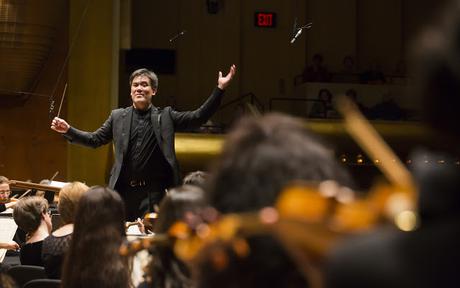by Paul J. Pelkonen

He's back: Alan Gilbert returned to the New York Philharmonic last week.
Photo by Chris Lee © 2017 The New York Philharmonic.
Mr. Gilbert's departure from the orchestra was announced in February of 2015, sending ripples through the music world. The conductor, who is the son of two retired orchestra members was the first New York-born music director in the ensemble's long history. He brought new programming ideas and initiatives to David Geffen Hall, but was lauded more for his innovative spirit than his actual podium skills.
Doubters might have had their minds changed on Friday afternoon, when Mr. Gilbert led off the concert with the Overture to Carl Maria von Weber's opera Oberon. This was Weber's last work, an opera that had a difficult birth in London. The stress of working on and revising Oberon ultimately claimed Weber's life. Sadly, this is the only part of this strange opera that one hears with any regularity. It is a little masterpiece, distilling this story of errant knights and fairy kings to a lean ten minutes. The music is dominated by a stirring horn theme and lyric writing for clarinets and strings.
Under their former boss, the Philharmonic players sounded fresh and invigorated. Richard Deane, the Acting Principal Horn (he is temporarily occupying the first chair in the much vaunted section as a stopgap replacement for the departed Philip Myers) showed his quality with robust, lyric tone. Following the introduction, the orchestra launched into the overture's feverish Allegro, making one wonder if this oddball opera would be worth revival in a concert performance.
Next, the orchestra offered the Mozart Sinfonia Concertante for Winds. For this work, featuring a cadre of stellar soloists from the woodwinds as well as Mr. Deane, ensemble and conductor found themselves battling the woeful acoustic of David Geffen Hall. It is a melancholy truth that the pointillist textures of chamber music can be swallowed up by this vast auditorium, although the addition of elaborate wooden screens zigzagging across the back of the stage alleviated matters somewhat. The performance was skillful, stiff and very polite.
The welcome surprise on the program (and the ultimate vindication of Mr. Gilbert) proved to be the concert-closing performance of Beethoven's Fifth Symphony in C minor. This ubiquitous work suffers from overexposure, but a performance like this one cements its reputation by giving new life to this music. From the crisp opening to the neatly starched fugato for strings, this proved to be four movements of inspired music making: a conductor and orchestra on the same page at last. It makes one wonder if the drama of 2015 was necessary, and one hope that Mr. Gilbert's future relationship with this orchestra is a long and fruitful one.

